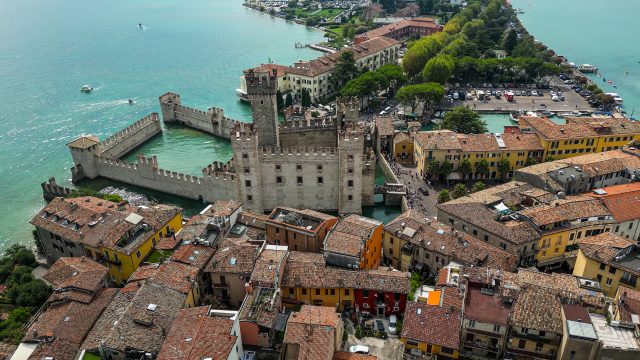How to sell Lugana wines
Consorzio Tutela Lugana DOC director Edoardo Peduto tells db about the efforts to position white wines from Lake Garda’s southern shore on the market.

Now entering the second year of his leadership of the consorzio, Peduto, who met db shortly after his appointment to the role at last year’s Vinitaly, noted that the 2023 harvest was not without its challenges: “Last summer we had two big hailstorms, at the end of April and the beginning of July, that cost us 35% of our crop.”
Certainly, Lugana DOC was by no means the only Italian appellation to fall victim to last year’s extreme conditions, with everywhere from Piemonte to Sicily receiving its fair share of climatic hazards, something that Peduto dubbed “the new normal”.
But there is no opportunity quite like a crisis.
“Importers want Lugana, but we don’t have enough wine,” suggested Peduto, “but having less product can be an opportunity to increase the value.”
When it comes to the demand, while there is certainly a domestic market, the lion’s share of the 70% or so of production that is exported is taken by Germany.
“Each restaurant [in Germany] has two or three Luganas on its wine list. There is a relationship between Germans and Lake Garda.”
Indeed, given it attracts an estimated 24 million day-trippers a year, Lake Garda is certainly a selling point for Lugana – simply put, people go on holiday there, drink the wines, and then want to buy bottles for their next dinner party when they get home.
“If you sell this, you win,” argued Peduto.
Sustained success
Beyond the lifestyle angle of Lake Garda that Lugana wines can trade on, sustainability is also something that the consorzio is very eager to push.
Partner Content
“We don’t have a magic wand to make it happen,” said Peduto, “but sustainability is key because it means we can work to preserve the land.”
“Each winery has to think for itself what it wants to do to preserve the land,” he continued, “the consorzio can be part of this.”
Most producers in the DOC have vineyards smaller than 10 hectares, and Peduto was adamant in his belief that the consorzio should promote these brands as much as the big names.
He revealed that around 50% of the vineyard area of Lugana DOC (around 2,000 ha), which is mostly planted with the white grape Turbiana, are certified as sustainable. Peduto also shared that the journey towards Equalitas certification was “complicated” but worthwhile, especially from a marketing perspective.
“Our wines have been sold into Scandinavia for a long time,” he shared, “but now consumers want this certification.”
Simple message
Perhaps the key point that Peduto was eager to push was the notion that “easy drinking doesn’t mean low quality”, and that Lugana DOC has to reach out to “the consumer, not just the wine lover”. In that same vein of thinking, “easy drinking” should not also be a synonym for “cheap”, according to Peduto.
“If you have all the right elements, you just have to show them to the public and communicate them,” he said. “Our world [wine] can be quite self-referential, we have to reach out, especially to younger people.”
“Social media activities are very important for this,” Peduto concluded. “We can explain our wine in an easy way: Lugana wines are easy to understand, and easy to drink.”
Indeed, the wines of Lugana DOC are far less fiendish to understand than those of other appellations, with five types: Lugana (still white wine making up 90% of production), Lugana Superiore (aged for at least 12 months), Lugana Riserva (aged for at least 24 months – six in bottle), Lugana Vendemmia Tardiva (late harvest), and Spumante (sparkling).
While this is certainly a stylistic breadth, what makes it easy to understand is that all are based on Turbiana. To discover more about this grape variety’s extraordinary versatility, click here.
Related news
Behind the label: Alto Adige and the question of language
For the eighth day of Christmas…
'Rare buying opportunities' as fine wine prices hit a five-year floor




